
Unit 5 offers a review of Ukrainian language structures and patterns which have been introduced in the previous lessons. Please note that Unit 5 is the midpoint in your course; the assignment at the end of this unit is your Midterm Exam.
In Lesson 2 you focused your attention on three cases, the Nominative, Accusative and Vocative, in the following contexts:
- Nominative Case – used as the subject of a sentence. Note that inverted order of sentences is common in Ukrainian.
- Accusative Case – review of simple sentences and the use of masculine nouns as direct objects. Motion must be implied by the verb.
- Vocative Case – review of hard endings and presentation of soft endings for masculine and feminine names.
Як ся маєте? How are you*?
(*this is both the plural form and the formal/polite form used to address the elderly, strangers or persons of special stature)
Шкода! Too bad !
|
Іменники: Відмінки
Nouns: Cases |
Називний відмінок: Перевірка - Nominative Case: Review
The Nominative Case is the subject of the sentence. This word is the focus of the sentence and the verb refers directly to it. Without it, the sentence does not make sense. Words in the Nominative Case are in their most basic form.
Роман удома. Тарас тут. Хлопець читає журнал. Дівчина грає в шахи.
Хлопці мають гроші. Тато й мама питають про квитки. Лариса має долар.
As mentioned in Unit III, inverted order (meaning that the subject is placed after the verb rather than before it) is not uncommon in Ukrainian sentences. However, this makes it a bit more challenging to find the noun which is the subject of the sentence. It is recommended that you change the word order to the more common form if you are having difficulty finding the subject of the sentence. Examples are given below.
Грають Вінніпеґ і Саскатун. → → → Вінніпеґ і Саскатун грають.
In Dialogue 5, you heard another example of inverted order, shown below.
Мамо, ось ідуть Тарас і Роман.
Mother, here come Taras and Roman. |
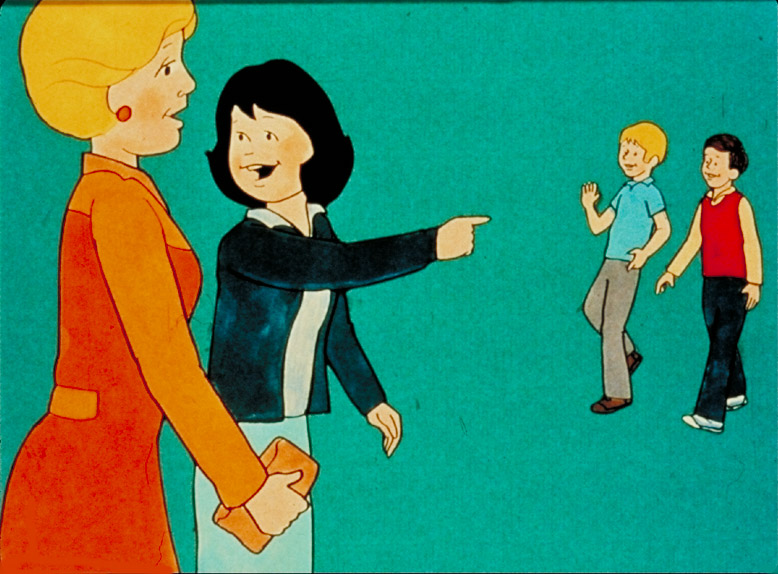 |
|
Note that in its regular word order, the sentence would appear as follows:
Ось Тарас і Роман ідуть , мамо.
Here Taras and Roman come, mother.
This particular sentence may seem a bit more challenging because of the added expressions мамо and ось.
Знахідний відмінок: Перевірка - Accusative Case: Review
A noun used in the Accusative Case is the direct object of the action or motion implied by the verb. In other words, the direct object is directly related to the action of the verb. In Unit II you were introduced to the Accusative Case of masculine hard nouns. Recall the following phrases, which denote the direct object of the action.
Я читаю журнал. Я читаю підручник. Я читаю словник.
The same pattern is followed when using the preposition про, which is always followed by the Accusative Case.
Я читаю про спорт. Я читаю про футбол. Я читаю про гокей.
Note once again that in each of the examples presented above, motion or action is implied. An activity is taking place or is about to take place.
You have also learned that if a masculine hard ending noun takes the Accusative Case, it does not change. The highlighted words in the sentences above are exactly the same in both their Nominative and Accusative forms.
In Units III and IV, the Accusative Case was used with the verbs грати, іти (йти) and the prepositions
у(в) and на as illustrated in the following sentences:
Саскатун і Вінніпеґ грають у футбол. Оленка грає в теніс.
Ми йдемо на футбол. Ти йдеш на баскетбол.
In Units III and IV, the Accusative Case was introduced with plural forms of hard masculine nouns, using the nouns квитки and гроші.
Тато питає про квитки. Він питає про гроші.
Ти маєш квитки. Ви маєте гроші. Хто має гроші?
In each example given, the same grammatical pattern is followed. Note the summary given below:
In both the singular and plural forms, the endings of the hard masculine nouns in the Nominative and Accusative Cases remain the same.
In Unit V, the pattern is reinforced, as shown in the examples below. Use the audio button to repeat the sentences several times.
| Ми йдемо на футбол. |
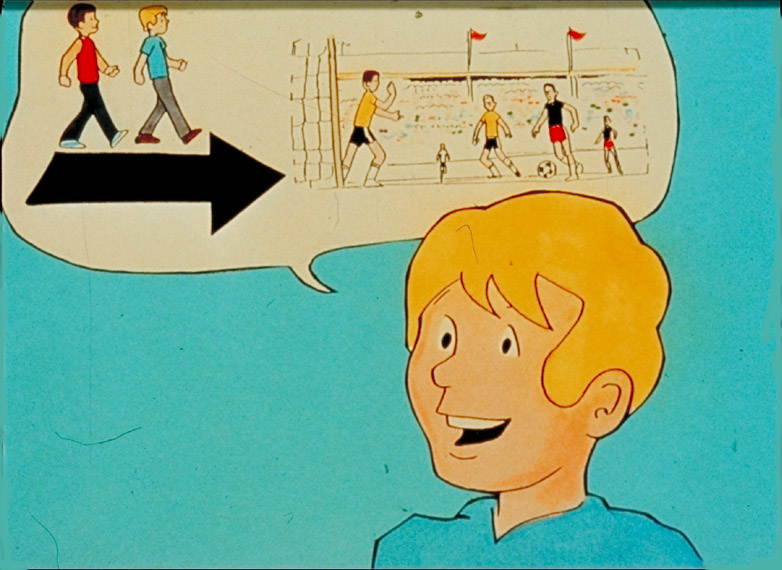 |
|
| Мама йде додому, а я йду на волейбол. |
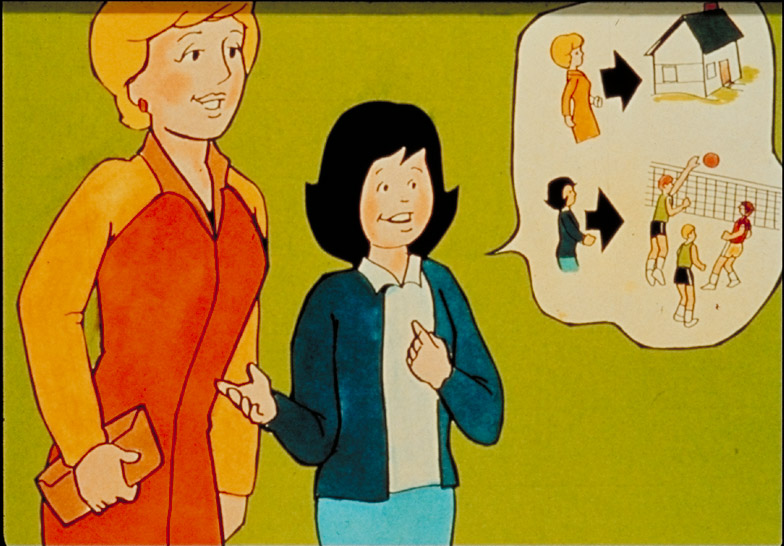 |
|
| Ти не йдеш на футбол? Шкода! |
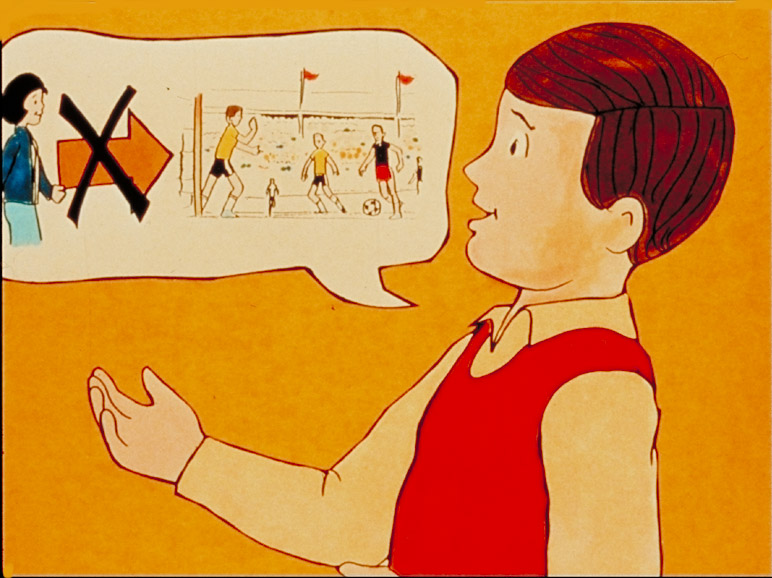 |
|
Кличний відмінок - Vocative Case
The Vocative Case is used when calling out to someone or speaking directly to them. This is a very immediate way to get the attention of a person who is standing at a distance or who is part of a larger group. In Unit I, you were introduced to the Vocative Case for masculine and feminine names with ‘hard’ endings. Some examples are:
| Тарас – Тарасе! |
Оленка – Оленко! |
| Роман – Романе! |
панна Козак – панно Козак! |
| Іван – Іване! |
Лариса – Ларисо! |
| Богдан – Богдане! |
Галина – Галино! |
| пан Козак – пане Козак! |
Анна – Анно! |
о - у
Марко – Марку!
тато – тату!
While you were also introduced to a few names with ‘soft’ endings, the Vocative forms for these names have not been given. They are being presented to you in this Unit. Please note the changes made for soft masculine and soft feminine names, as listed below.
| ь– ю |
я - ю |
| Василь - Василю! |
Соня – Соню! |
| Івась - Івасю! |
Галя – Галю! |
| Михась - Михасю! |
Надя* – Надю! |
| й – ю |
ія - іє |
| Андрій – Андрію! |
Надія* – Надіє! |
| Юрій - Юрію! |
Софія – Софіє! |
With practise, these endings will become a natural extension of your oral speaking ability. In Unit II and Unit V, you have been introduced to two forms of the expression “How are you?” in Ukrainian. The forms are reviewed below.
| Як ся маєш, Тарасе? |
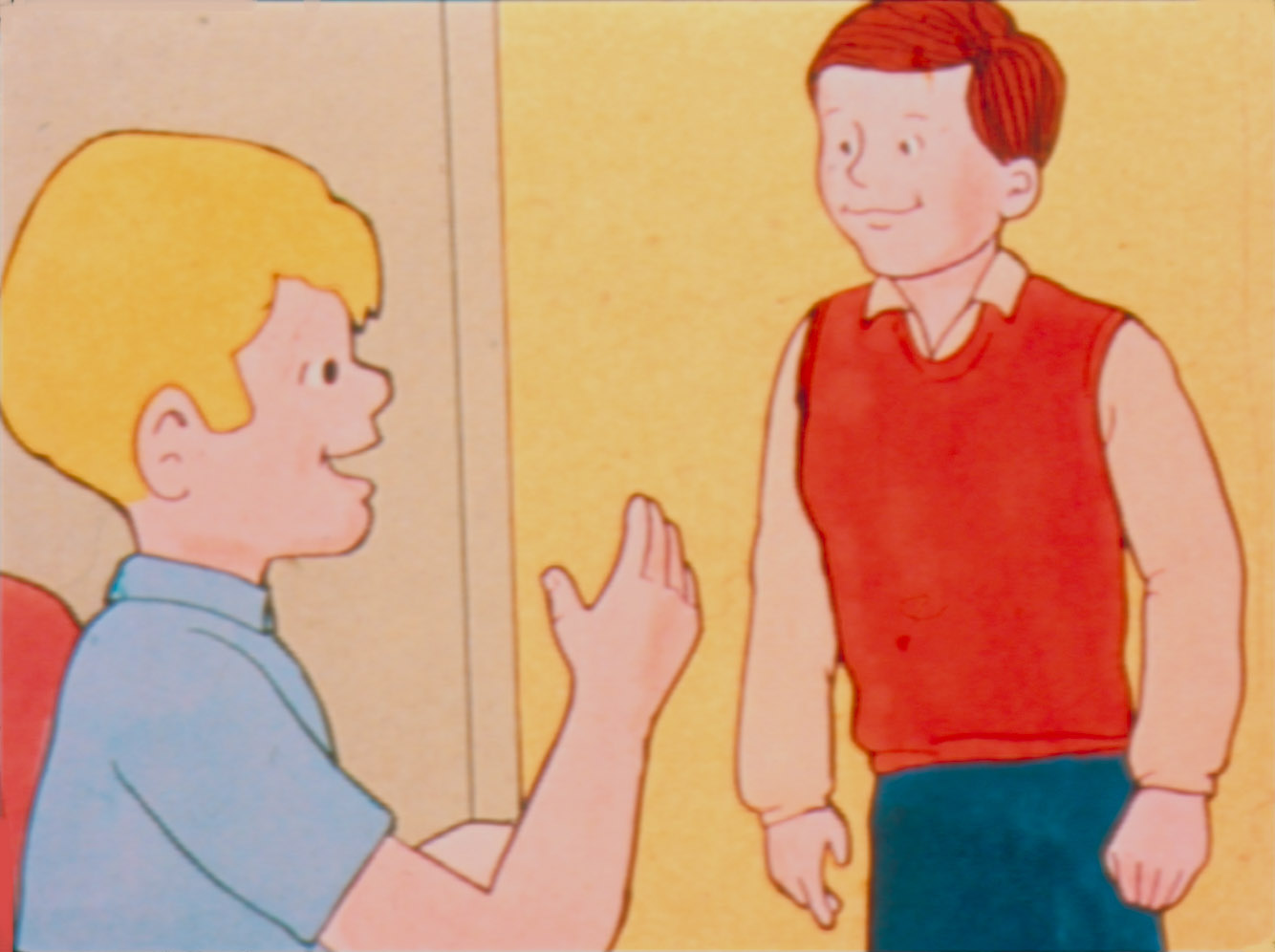 |
|
| Як ся маєте, пані Козак? |
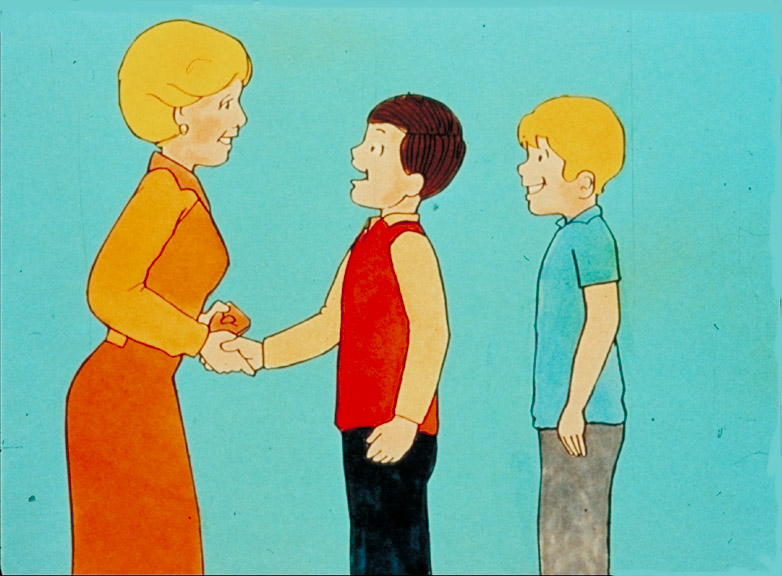 |
|
You will notice that in the second example the plural form of the verb мати is used, even though only one person is being addressed. Remember that this form is often used when addressing the elderly, persons of stature (such as priests or officials) or strangers. It is considered culturally appropriate to show respect for these individuals in this manner.
V. Exercise 2.i
Complete each sentence with the Vocative Case, as shown in the examples.
Part 1
• |
Це Петро. |
Добридень, Петре. |
|
|
|
1. |
Це Марко. |
________________________________ |
|
|
|
2. |
Це Євген. |
________________________________ |
|
|
|
3. |
Це Юрась. |
________________________________ |
|
|
|
4. |
Це пан Лис. |
________________________________ |
|
|
|
5. |
Це Одарка. |
________________________________ |
|
|
|
6. |
Це Соня. |
________________________________ |
|
|
|
7. |
Це Марія. |
________________________________ |
|
|
|
8. |
Це пані Дума. |
________________________________ |
|
|
|
9. |
Це панна Филипчук. |
________________________________ |
|
|
|
10. |
Це Ігор. |
________________________________ |
|
|
|
Part 2
• |
Петро |
Допобачення, Петре. |
|
|
|
1. |
Юрій |
___________________________________________ |
|
|
|
2. |
Орися |
___________________________________________ |
|
|
|
3. |
Славко |
___________________________________________ |
|
|
|
4. |
Софія |
___________________________________________ |
|
|
|
5. |
Тамара |
___________________________________________ |
|
|
|
6. |
Кіндрат |
___________________________________________ |
V. Exercise 2.ii
Complete each sentence with the Vocative Case, then practise reading the sentences aloud in order to become comfortable with the changed endings for each name.
1. |
Оленка |
________________________________ Добридень, ! |
|
|
|
2. |
Оксана |
________________________________ Як ся маєш ? |
|
|
|
3. |
Лариса |
________________________________ Добре, дякую . |
|
|
|
4. |
мама |
________________________________ , куди ви йдете? |
|
|
|
5. |
панна Козак |
________________________________ , як ся маєте? |
|
|
|
6. |
пані Козак |
________________________________ , де ви? |
|
|
|
7. |
Марія |
________________________________ , куди ти йдеш? |
|
|
|
8. |
Надія |
________________________________ , ти не йдеш на футбол? |
|
|
|
9. |
Софія |
________________________________ , що ти читаєш? |
|
|
|
10. |
Орися |
________________________________ , що ти робиш? |
|
|
|
11. |
Леся |
________________________________ , коли ти читаєш? |
|
|
|
12. |
Ксеня |
________________________________ , де мама? |
|
|
|
13. |
Тарас |
________________________________ , чи тато вдома? |
|
|
|
1 4. |
Роман |
________________________________ , про що Тарас читає? |
|
|
|
1 5. |
пан Козак |
________________________________ , коли ви читаєте журнал? |
|
|
|
1 6. |
Маруся |
________________________________ , чи ти не граєш у теніс? |
|
|
|
17. |
Наталка |
________________________________ , куди хлопці йдуть? |
|
|
|
18. |
Лідія |
________________________________ , хто має квитки ? |
|
|
|
19. |
Богдан |
________________________________ , чи ти йдеш додому? |
|
|
|
20. |
тато |
________________________________ , до побачення? |
|
|
|
21. |
Катруся |
________________________________ , де журнал? |
|
|
|
22. |
студенти |
________________________________ , куди ви йдете? |
|
|
|
23. |
хлопці |
________________________________ , хто грає в теніс? |
|
|
|
24. |
Надя |
________________________________ , де тато? |
|
|
|
25. |
дівчата |
________________________________ , коли ви граєте? |
|
|
|
V. Exercise 2.iii
Complete the exercise using the Vocative Case of the name given and the culturally appropriate phrase: Як ся маєш? or Як ся маєте?
1. |
панна Баран |
___________________________________________ |
|
|
|
2. |
Петро |
___________________________________________ |
|
|
|
3. |
Тарас |
___________________________________________ |
|
|
|
4. |
мама |
___________________________________________ |
|
|
|
5. |
Петрик |
___________________________________________ |
|
|
|
V. Exercise 2.iv
Identify whether the underlined word in the sentence is in the Nominative Case (Називний відмінок) or the Accusative Case (Знахідний відмінок). An example is given.
- Мама читає журнал. мама - називний
- Чи Тарас має гроші? гроші - знахідний
1. Дівчата мають словник. ____________ - ________________
2. Хлопці читають і грають. ___________ - ________________
3. У що Оленка грає? _____________ - ________________
4. А коли вони грають у теніс? ______________ - _______________
5. Маруся не грає в спорт. _____________ - _______________
6. У ґольф грають тато й я. ____________ - _____________
7. Чи мама й Леся вдома? ______________ - ______________
8. Я йду на волейбол. ______________ - _______________
9. Іван не грає в карти? Шкода! _____________ - ______________
10. Ось йде пан Козак! ______________ - _______________
V. Exercise 2.v
Complete the exercise using the Vocative Case and the appropriate form of the expression “How are you?” An example is given.
- (Анна) Добридень, Анно! Як ся маєш?
1. (Лариса) Добридень, ____________! _____________________
2. (Таня і Галя) Добридень, __________________! ____________________
3. (пан Баран) Добридень, ____________! _____________________
4. (Юрій) Добридень, ____________! _____________________
5. (панна Слимак) Добридень, ____________! _____________________
6. (мама) Добридень, ____________! _____________________
7. (хлопці) Добридень, ____________! _____________________
8. (Борис) Добридень, ____________! _____________________
Read each sentence aloud, paying close attention to intonation and expression.
|








